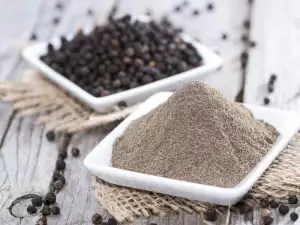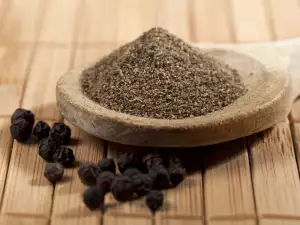In cooking, black pepper is widely used in any form: as a mixture, in the form of grains and powder. Its strong smell lasts long enough. Black pepper is especially good when added to meat and fish dishes. Cooking with black pepper is a guarantee for a tasty and fragrant dish. And adding it to spaghetti with sauce, chicken with cabbage, lamb with spinach, pork with rice, veal with potatoes is a classic.
Improving the taste of food, black pepper quietly offers great benefits to the body. Black pepper is a pleasant spice, but does it hide dark secrets?
Is black pepper harmful?
The truth is that it can cause trouble for some people. For people who have liver problems, black pepper is not recommended.
Black pepper is also contraindicated for people suffering from urinary tract diseases. Black pepper is a spice that is irritating to the stomach lining.
Even a perfectly healthy person can get unpleasant sensations in the esophagus after eating dishes that are seasoned with black pepper.
Black pepper is bad for people who have gastritis or ulcers - for them, consuming black pepper can be critical.
With the consumption of this spice and the subsequent irritation of the gastric mucosa, there is a possibility of bleeding.
The consequences of this reaction for people with gastritis and ulcers are difficult to predict. In some cases, black pepper can have a negative effect on the reproductive system.
The unpleasant thing in this situation lies in the fact that it is difficult to understand what causes the negative effect and people continue to generously sprinkle their dishes with black pepper.
To reduce the harm of black pepper, this spice should be used in moderation, which adds an unique taste to dishes. Excessive use is not recommended.
It should be noted that you can not generously sprinkle every dish with black pepper, without thinking about the possible negative effects of overdoing the spice.
Black pepper also has many beneficial properties, but people who have stomach problems should be careful with its consumption.
The ability of black pepper to have a therapeutic effect makes it the most healthy of all spices.
Benefits of black pepper

- improves appetite;
- stimulates the production of digestive enzymes;
- has a pronounced antibacterial property;
- improves blood circulation, which has a positive effect on - the activity of the heart and brain;
- prevents the development of malignant tumors;
- has analgesic properties;
- it is an excellent expectorant;
- due to its ability to dilute the blood, it prevents - the formation of blood clots;
- stimulates sexual activity.
It acts on the production of endorphins (the hormone of "happiness") and serotonin - a hormone responsible for many functions in the body, including immunity and good sleep.
However, we can not fail to mention some harms of black pepper consumption. In case you have not used this spice yet, or you find yourself using it in large quantities, you should know what to expect.
Black pepper side effects
Damage to the stomach
Studies show that black pepper can cause damage to the stomach lining. A person who used black pepper showed symptoms of gastric bleeding. The long-term safety of the spice needs further study.
The pepper in the black pepper can leave a sharp, "burning" aftertaste. Although this is only a characteristic of black pepper, its consumption in excess amounts can leave a similar burning sensation in the throat and stomach.
Change in drug absorption
Black pepper promotes the absorption of certain drugs. These include those that boost liver metabolism and antihistamines that fight allergies.
Piperine acts as a biogenizer in the absorption of the drug. Although this may be beneficial if a drug is poorly absorbed, it can also lead to excessive absorption of some drugs to dangerously high levels.
Not recommended during pregnancy

The scientific community does not recommend the use of black pepper by pregnant and breastfeeding women, as the spice can cause heartburn or burning.
May affect male fertility
Piperine can also affect male fertility. In a study in rats, the compound was found to damage sperm. Increases the concentration of harmful radicals in the epididymis (a channel in the male reproductive system where sperm are stored).
May cause reddening of the skin
There is limited research in this regard. Research shows that cosmoperine, a compound isolated from black pepper, causes reddening of the skin due to vascular congestion (when vascular tissue fills with blood and other fluids). This is accompanied by a tingling sensation in the skin.
May make you sneeze
This may not be a serious side effect of black pepper, but it is important to know. The piperine in black pepper is an irritant. Inhaling the smell of black pepper can irritate the nerve endings in the nasal mucosa. This makes you sneeze, because your nose wants to release the irritant.
Black pepper can be a popular and common ingredient in most dishes. But it is important to know when to not use it - because some of its side effects can be severe.
Remember!
Black pepper, intaken in reasonable quantities - about 1-2 pinches, is healthy. Although overdoing it is unlikely (given its pungent taste), it can lead to problems. Therefore, stick to normal amounts of it.
Pregnant or breastfeeding women and anyone who has gastrointestinal problems or fertility should stay away from black pepper. We also recommend that you consult your doctor.
Note that individual black pepper intolerance is not ruled out, so if you are using the spice for the first time, monitor your body's reactions.



















Comments